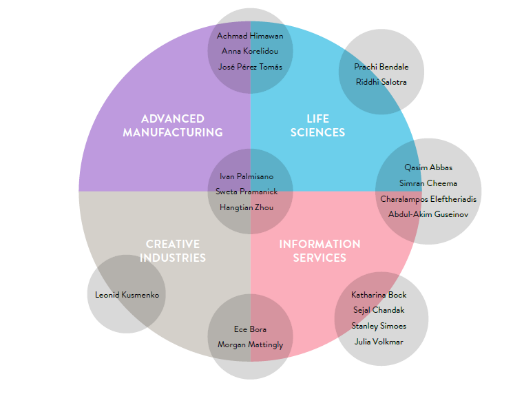About CITI-GENS
CITI-GENS is a Horizon2020 funded Marie Skłodowska-Curie doctoral training programme that supports 20 interdisciplinary PhD students at Queen’s University Belfast. PhD students funded within Marie Skłodowska-Curie programmes have the title of Early Stage Researcher (ESR).
CITI-GENS will transform 20 researchers into a skilled cohort addressing global challenges centred on the four themes of the Innovation strand of the Belfast City Deal - Creative Industries, Information Services, Life Sciences, and Advanced Manufacturing.
To read more about our researchers and their projects click here.
In seeking to address global challenges in new ways, the CITIGENS ESRs will adopt methodologies at the forefront of current practice in innovation. They will combine their advanced disciplinary excellence with capacity for genuinely interdisciplinary, intersectoral, and international quality research. This will be achieved by participating in both scientific and personal development programmes that significantly enhance professional as well as academic profiles. The CITI-GENS DTP is designed to adopt a cross-disciplinary and crosssectoral approach from research project initiation to completion.
CITI-GENS has been developed on the basis that future societal challenges will emerge across rather than within economic and social sectors, requiring new technologies that are emerging or not yet developed, and which outpace developments in social structures and conventions.
This is the key value of CITI-GENS: it demands an openness to innovation, pioneer thinking and creativity as well as pushing the boundaries of research in their fields. These qualities will be nourished through a range of leadership and development opportunities within the Graduate School, as well as a bespoke training package on design thinking, growth mindset, social innovation and entrepreneurial leadership for the 21st century.
Our researchers are based in academic Schools or research institutes across all three of Queen’s Faculties:
Arts, Humanities and Social Sciences (AHSS)
Engineering and Physical Sciences (EPS)
Medicine, Health and Life Sciences (MHLS)
About the Belfast City Region Deal
CITI-GENS has been developed around the new Belfast Region City Deal (BRCD).
City Deals are a mechanism by which resources are targeted based on a deep understanding of regional needs and ambitions across the UK. Their goal is transformation of regional economies for the widest possible benefit. Since 2011, there have been three waves of City Deals, covering virtually every major city across England, Scotland and Wales.
In 2019, the Heads of Terms for a Belfast Region City Deal were signed by the UK Government, paving the way for the development of detailed proposals for projects to stimulate inclusive growth in the region and Northern Ireland (NI). The formal BRCD partners include the NI Civil Service, six local authorities, six further education colleges, and the two universities in Belfast.
There are four pillars to the BRCD:
- Innovation and Digital
- Tourism and Regeneration
- Infrastructure
- Employability and Skills
CITI-GENS focuses on the Innovation and Digital pillar. A broad base of private sector partners, from all areas of strength within the regional economy, have been involved in the development of Innovation project proposals, and as a result, the projects have industry/ non-HEI needs at their core.
Shared understanding of the opportunities and challenges for the region across this network of partnerships between industry, academia and the public sector is the foundation for the success of the Belfast Region City Deal. Through the innovation projects, we aim to create a new ecosystem in which discovery, creativity and technology will flourish.
How will we work with BRCD?
Our research projects are linked to the four themes under the Belfast Region City Deal innovation pillar.

For more information about the CITI-GENS Programme, please contact the CITI-GENS Coordination Team citigens@qub.ac.uk
